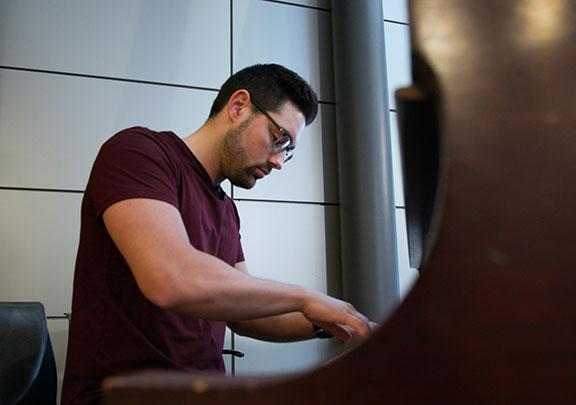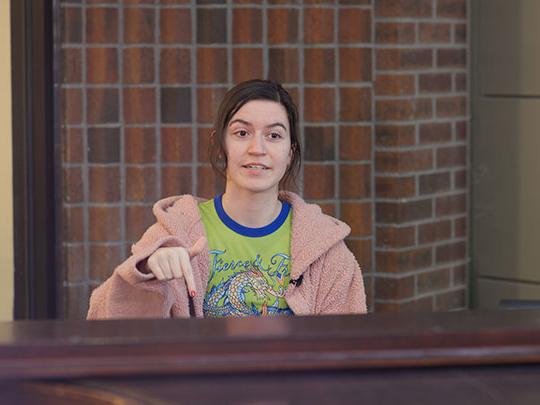
PFW Story
Dare to share: Walb piano players show courage and add to atmosphere
The first time Brittany Semons slipped behind the Walb Student Union’s walnut brown piano last year, nerves almost caused her to black out on the notes. Regaining confidence, she tried again a few weeks later and zoned in on playing.
“I play at Walb when I am super-stressed out or need a minute to ground myself,” the Purdue University Fort Wayne sophomore said. “I like how it sounds, and the acoustics are beautiful. I like how my emotions can flow through my fingertips and release from my body.”
Semons said she doesn’t read music or use the proper technique but unpretentiously enjoys playing. She’s one of maybe a dozen performers who show courage and dare to share behind the 1973 Grand Model L Steinway and Sons piano tucked away in the corner of the union’s ground floor. Mostly, Semons plays for herself, but it’s also a bonus for everyone nearby.
Though not music majors, most are self-taught within the last few years or took lessons long ago. They won’t become professionals, but always show a performer’s fearlessness.
“Courage is definitely an important thing, and it really does take a lot to just start off,” said junior Preston Graber, a talented player who pounds the keys with passionate abandon. “Keep playing even if you mess up because the average person won’t notice. Keep playing and it will sound fine.”
Some play for reasons more important than personal enjoyment, though that always comes through.
“I have panic attacks occasionally, and obviously that sucks to have happen on campus,” said sophomore Fiona McKinney. “I can sit where I am and have a terrible time, or I can come play the piano, and by the time I’m through most of my songs, I’m chill.”
Playing provides enough distraction to help her focus, but doesn’t scream she’s having difficulty. With racing thoughts, flash sweats, and consuming fear, panic attacks can be debilitating. As a person feels one coming, it’s usually too late to counter, and the anxiety must finish its course in a helpless experience.
“It’s really good to have a piano here so I can play and don’t have to sit and watch people walk by while I’m losing my mind,” McKinney said with a shy smile. “Playing the piano is just enough to keep my brain busy until it’s over.”
Piano playing can also positively influence others, changing the building’s atmosphere and the moods of those listening.
“It’s not about me but putting smiles on people’s faces and making their days better,” freshman David Janeczko said after playing on a Saturday afternoon in February.
A listening student once passed him a thank you note for making her rough morning a little brighter.
With its inclusive nature and spirit, the music echoing through the atrium draws attention, with people walking one or two floors up often stopping where they are to listen.
“When you listen to live music in the same room as you, it feels like it’s surrounding you like you are part of it,” freshman Ethan Krider said. “When I’m in a band playing or just listening to something live, there are different emotions that are stimulated when you hear that sound.”
And those feelings are enhanced by creating the sound. Apprehensive about an upcoming speech class, Krider believed if he could play piano in front of others, the class would be easier because music is more personal.
Most players perform two or three times a week at various hours of the day and night. A dozen people may be eating nearby, or the building could be empty, but their sounds fill the gaps.
The music can range from Cold Play to Beethoven to Bruno Mars to Ludovico Einaudi to the Pixies— whomever or whatever the players feel inspired by—even the theme to “Halloween.” Some make up portions or join different song parts until producing music they enjoy.
As Graber suggested, maybe improvisation helps clear their stress in ways others do with video games.
After meeting during orientation last year and playing the piano during a break in the tours, sophomore buddies Alex Battershell and Brayden Campbell frequently play together these days, performing off an app instead of reading sheet music.
“I think it’s because we both like a good amount of the same songs,” Campbell said, “and because we’re good friends, so if one of us or both mess up, there’s a lot less fear of embarrassment and we just roll with it.”
Usually, Battershell plays the lower keyboard notes with the bass to keep the tempo going, and Campbell taps the higher notes and provides vocals. It took a little time until acclimating and finding their rhythm.
“It’s easier to do a lot of certain songs, especially if it’s something we are not really, really good at individually,” Battershell said. “It just sounds better.”
Before pushing himself to play with Campbell, Battershell hated doing some things in front of people because it didn’t feel natural, but now he has more confidence.
And confidence is key to performing for others and takes time to build, proving they should be celebrated.
“After doing something a couple of times, when you get used to something, it’s going to be less nerve-wracking,” Krider said. “It’s cool to have that state of mind about a lot of things. Imagine if people could step outside of their comfort zone that one time and move forward.”








